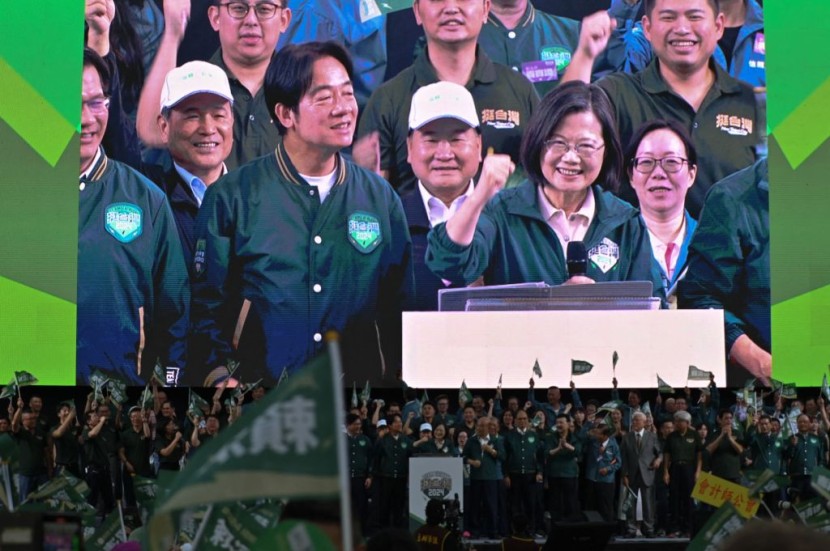Despite China's warnings, William Lai Ching-te of the ruling Democratic Progressive Party (DPP) emerges victorious in Taiwan's presidential election. China, asserting Taiwan as its territory, had cautioned against supporting him.

A large screen shows Taiwan President Tsai Ing-wen gesturing next to Lai Ching-te (Tsai's L) presidential candidate for 2024 from the ruling Democratic Progressive Party (DPP), during a campaign rally in New Taipei City on November 4, 2023.
It was recently reported by Al-Jazeera that following the victory of William Lai Ching-te from the Democratic Progressive Party (DPP) in Taiwan's presidential election, Beijing asserted that the DPP does not represent the mainstream public opinion on the island. Despite China's warnings against voting for Lai, it stated, according to Al-Jazeera, that the vote "will not impede the inevitable trend of China's reunification."
Lai, the current vice president, participated in a three-way race with Hou Yu-ih from the conservative Kuomintang (KMT) and former Taipei Mayor Ko Wen-je from the Taiwan People's Party (TPP). Lai secured 40.2 percent of the votes, according to the Central Election Commission.
Following his defeat, as disclosed by Al Jazeera, opponent Hou conceded and congratulated Lai, apologizing to KMT supporters for not removing the DPP. Ko also conceded defeat.
In his victory speech, Lai thanked the Taiwanese people and his opponents, stating, "We are telling the international community that between democracy and authoritarianism, we will stand on the side of democracy."
Expressing hope for a return to "healthy and orderly" exchanges with China, Lai reiterated, as disclosed by Al-Jazeera, his desire for talks based on dignity and parity. China, in response, affirmed adherence to the one-China principle and opposition to separatist activities and "foreign interference."
China's Influence and Military Pressures
Taiwan's elections hold significance due to the disputed political status. Although self-governing, China claims the island and has not ruled out the use of force to achieve its ambitions.
Before the polls, China labeled Lai as a dangerous separatist, warning of threats to regional peace if he won. Lai, in his victory speech, asserted, as revealed by Al Jazeera, that the Taiwanese people successfully resisted external efforts to influence the election, seemingly directed at China.
Lai remains committed to peace and conditional engagement with Beijing while strengthening the island's defenses. The election outcome underscores the complex dynamics in the region amid longstanding tensions between Taiwan and China.
It was further revealed by Reuters that leading up to the election, China condemned Lai as a dangerous separatist, urging the people of Taiwan to make the right choice and highlighting the "extreme harm of the DPP's 'Taiwan independence' line." Despite Lai's repeated calls for talks, China remained unyielding.
In response to Lai's election, as detailed by Reuters, China's Taiwan Affairs Office adopted a milder stance, avoiding mention of him by name. It stated that the election results demonstrate the DPP's inability to represent the mainstream public opinion in Taiwan.
The office affirmed China's unwavering commitment to resolving the Taiwan question and achieving national reunification. It expressed openness, according to Reuters, to collaboration with "relevant political parties, groups, and people" from Taiwan to enhance exchanges and cooperation, promoting peaceful development in cross-strait relations and the cause of national reunification.









